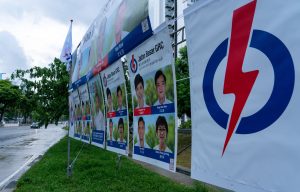Singapore’s Prime Minister Lawrence Wong yesterday formed a committee to review electoral boundaries, an indication that a general election will be held sometime mid-year.
The Electoral Boundaries Review Committee (EBRC) is convened by the prime minister ahead of every general election to review and make changes to Singapore’s electoral map, taking into account population changes and other developments. The report is used to determine both the total number of parliamentarians and the number of representatives in each constituency.
In a Facebook post yesterday, Wong confirmed that he had convened the EBRC, adding, “I look forward to the committee’s report and its recommendations in due course.”
The Elections Department (ELD) said in a statement that the committee has been directed to recommend the number and size of Group Representation Constituencies (GRCs) and Single Member Constituencies (SMCs).
“The committee should seek to keep the average size of GRCs, the proportion of Members of Parliament (MPs) elected from SMCs, and the average ratio of electors to elected MPs, all at about the same as that in the last General Election,” the ELD said.
GRCs are constituencies in which teams of candidates, usually four or five, compete to be elected rather than individual candidates, as in the 14 SMCs. The purpose of GRCs, of which there are currently 17, is to ensure balanced representation among Singapore’s various ethnic groups.
The formation of the EBRC, which includes senior officials from the ELD, Housing and Development Board, Singapore Land Authority, and Department of Statistics, is usually the first step toward the convening of a general election in Singapore. The city-state generally calls an election within two months of the committee publishing its report on the review, a process that based on recent elections could take anywhere from three weeks to seven months.
As Channel News Asia noted, over the past four general elections, in 2006, 2011, 2015, and 2020, the total time between the convening of the EBRC and polling day has varied between three and 11 months, although the latter interval was likely a result of the COVID-19 pandemic. Given that the next election must be held by November, all of this points to an election sometime mid-year.
Whenever it is held, and whatever changes the committee recommends to the country’s electoral boundaries, the pressure will be on Wong, who will be leading the ruling People’s Action Party (PAP) into an election for the first time since taking over from his predecessor Lee Hsien Loong, the son of founding Prime Minister Lee Kuan Yew, in May of last year.
Wong and the PAP will be forced to grapple with a decline in support among younger voters. Despite winning 83 of the 93 seats in parliament and 61 percent of the popular vote at the last general election in 2020, the PAP’s support fell 9 percent from the general election of 2015. Surveys conducted after the 2020 poll found that support for the opposition Workers Party, which won the remaining 10 seats, was highest among those aged 21-25. Meanwhile, the Progress Singapore Party, a new party headed by the ex-PAP stalwart Tan Cheng Bock, did not win any seats but came away with just over 10 percent of the popular vote.

































